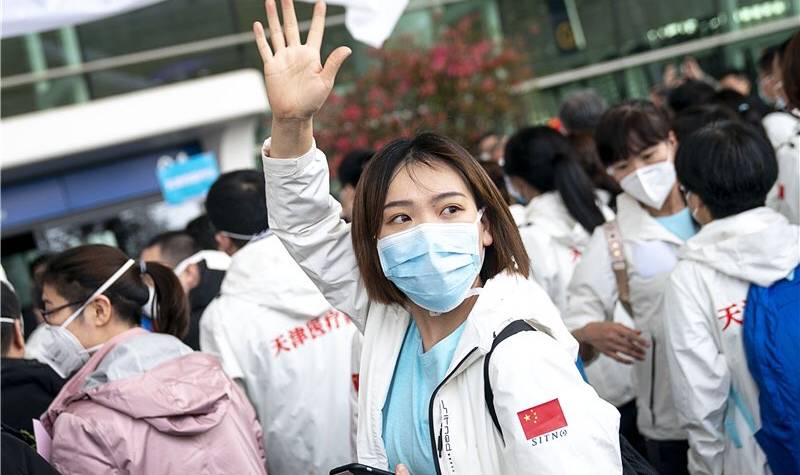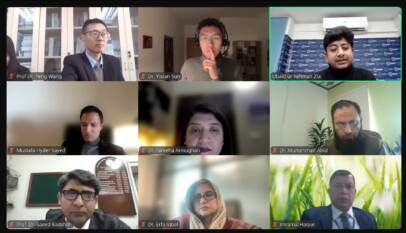China set a precedence to combat pandemic outbreak
A Pakistani student of medicines in Wuhan city of China has applauded Chinese efforts to overcome the pandemic outbreak. He appreciated Chinese authorities’ for providing unbiased treatment to locals and foreign nationals and mentioned Pakistani students were treated like their own citizens in a crucial time. The optimistic behaviour and positive attitude have helped China to control the spread and emerge as a successful nation with zero new local case of COVID-19 today. He further urged Pakistan government to learn from China to counter the spread of the epidemic.
Confronting coronavirus in China: A Pakistani’s tale
A Pakistani student stuck in Wuhan during lockdown gives advice on how Pakistan can win the battle against corona.
Sheema SiddiquiUpdated about 11 hours ago
While most of the world was trying to contain the spread of Covid-19 coronavirus, the city of Wuhan in China, that became the epicenter of the plague, was showing signs of recovery.
A Pakistani student, Shaheer Ali Abro, who found himself stranded in the midst of the deadly virus has many interesting insights about the way the Chinese administration tackled the situation.
Shaheer, a resident from Hyderabad, Sindh, is a final year medical student at Yangtze University in Jingzhou and Wuhan in Hubei province. He has been in China for the past four years.
Read more: Wuhan reports no new virus cases, offering hope to world
Shaheer shares his personal experience of living in a lockdown, going through self-isolation and how progress was made in China?
End of self-isolation in Wuhan
Wuhan made headlines for being the origin of the deadly virus that has now engulfed most parts of the world, endangering thousands of lives. But now, the city was fighting its way back to normalcy.
On March 16, there was just a single reported case of coronavirus from the city and the death toll in entire China stood at 13 — a considerable decrease keeping in view the past trends.
It is true that the virus hasn’t been controlled in full but these little improvements show hope that things are moving in the right direction.
For Shaheer, this was a positive development as he and other students were allowed to end their self-isolation and resume their lives as they were before the outbreak.
“When I left my hostel for university in the morning today, Wuhan and the cities connected to it showed signs of life coming back to normal. The roads that were deserted were open again… there might not have been many cars on the roads but the metro bus service was operational and so were inter-city buses. These were the signs that a city that went into self-isolation was coming back to life,” he said.
Shaheer said universities in the city were fully open. However, schools and colleges were gradually opening. People, too, were doing their bit to bring things to normal, he said.
“But it’s necessary to mention that despite trying to bring things back to normal, people are still being extra careful and for this reason alone you could still see them wearing masks as they go about their lives. We could say the city that went to sleep is now finally waking up.”
When the virus started to spread in Wuhan
It was in cold December that the news of a deadly virus broke out, Shaheer said.
“We had our winter vacations and Chinese people were also preparing for celebrations of their new year when we started receiving news related to the outbreak. Naturally, we took it lightly as we hadn’t seen a virus spreading so fast ever before,” he added.
Shaheer said they were careless and making travel plans.
“We thought this would be over soon. Our attitude was similar to what we are seeing now in Pakistan. Schools were shut down as a precautionary measure but people were going for picnics.”
He said the intensity of the situation hit them in the first two weeks of January, when cases continued to be reported at a rapid speed and as a result of which the Chinese government had to lock the city of Wuhan down.
Timely efforts by Chinese government
At a time when the number of patients and death toll was constantly increasing, the Chinese government prioritised individuals and ensured everybody was taken care of well.
“Those of my friends who stayed for a few days either in Wuhan or nearby areas were kept in isolation centres and those who were found to be passing through the affected areas were also kept in separate isolation centres and their medical tests were frequently taken. I think everybody received the same attention and treatment by the Chinese authorities,” Shaheer said.
‘Ghabrana Nahi Hai!’
Shaheer said as the situation developed, students panicked and were visibly disturbed and distressed.
“What’s going on in Pakistan at the moment, we can understand. Back in Wuhan, it was an emergency-like situation, all I would like to say to Pakistanis is ‘ghabrana nahi hai’ (don’t panic) as people who panic tend to make more mistakes and this virus doesn’t give you any room to make mistakes,” he said.
According to Shaheer, their families back in Pakistan wanted them to return home but only they knew how risky that would’ve been.
“By January, Covid-19 had become a plague. Not only Wuhan, many other provinces in the country were also in a lockdown. At such a critical time, the Chinese government took as much care of Pakistani students as they did of their own citizens.”
Why is self-isolation necessary?
Shaheer doesn’t think People in Pakistan are fully aware about the quarantine centres developed here. He said it is the administration and medical staff’s responsibility to convey this knowledge to the people.
“The best way to stop the virus is to identify people with positive test results. That’s what Chinese authorities made sure to do and tried to put anybody who went to Wuhan through quarantine points and check on them on a daily basis. On this front, the Sindh government’s efforts are praiseworthy,” he said.
What does lockdown or isolation mean?
In case Pakistan was to be locked down, Shaheer said, then the best possible advice for anybody would be to follow and act on the instructions given by the government. This would not only ensure individual safety, but would also protect others from harm.
“In Wuhan, all roads leading out of the city were closed and so were buses, trains, metro station, airports, and freeways. There was simply no way to go out of the city. These measures reflected the urgency of the situation.
“Come to think of it, I now realise how important those decisions were. We hadn’t seen such scenes before and soon were asked to go into self-isolation. We were under strict orders to not leave our hostel rooms and call the helpline when in need of immediate assistance. Our movement was completely banned and we were attended by medical staff on a daily basis.”
Shaheer said he would like to convey the same to Pakistani citizens to “stay at home and get checked”. He said self-isolation could get tricky and result in mental distress for many. In order to make it easy, Shaheer said his advice would be to keep busy and stay in touch with others via mobile, telephone, and emails.
Health first
Though it may sound inappropriate, Shaheer says, it was still the best strategy to “think about yourself first” before anybody else.
“We and residents of Wuhan strictly followed the instructions given to us by the authorities. Unless it was an emergency, we never left our rooms and in the entire week, only one person could leave the room with a permission letter,” he said.
Shaheer said the people of China acted against the virus on war footing. The reason the country was able to control the spread was because of its positive attitude.
“On an individual basis, we can play our part by staying at our homes. This is our responsibility. We should regularly wash our hands and ensure cleanliness around us, which is the easiest and most effective safety measure to counter the spread of the virus,” Shaheer said.
Difficulties in stocking food
During the lockdown in Wuhan, shortage of food supplies was a problem many faced.
Normally, students relied on eateries. When the impact of the coronavirus was felt following a complete lockdown, what students found to be most lacking was the availability of food and in some areas, even water.
“You can’t use tap water for drinking in China but during lockdown we had to use that for a week. But fortunately, the Pakistan embassy reached out to us soon and things started to settle down,” Shaheer said.
What Pakistan needs to do?
To counter the spread of the coronavirus, Pakistan government should follow China’s footsteps.
Shaheer said, “China’s population is much bigger than Pakistan and the situation turned severe but some of the big decisions that the Chinese government undertook eventually paid off well.”
He pointed out that whenever anybody had complained about fever or symptoms similar to coronavirus, doctors and ambulances would reach and check them personally. This, Shaheer said, helped in effective management as treatment at the hospitals and quarantine centres was limited for only those who tested positive for the virus.
Advising Pakistanis, Shaheer said, “If there is somebody who doesn’t have rations at their homes then a mechanism should be devised to make supplies available to them at their doorsteps.”
“There is also an urgent need to look after elderly and ensure basic medication for flu, cough, and fever are available at homes. To help manage all this, coordination teams comprising people from towns should be formed and assigned with tasks.
“For government, they should make sure the prices of supplies don’t hit the skies and they continue to remain available in the markets,” he concluded.
Chinese Ambassador highlights significance of Third Plenary Session for China-Pakistan cooperation
The Third Plenary Session of the 20th Central Committee of the Communist Party of China ha…












